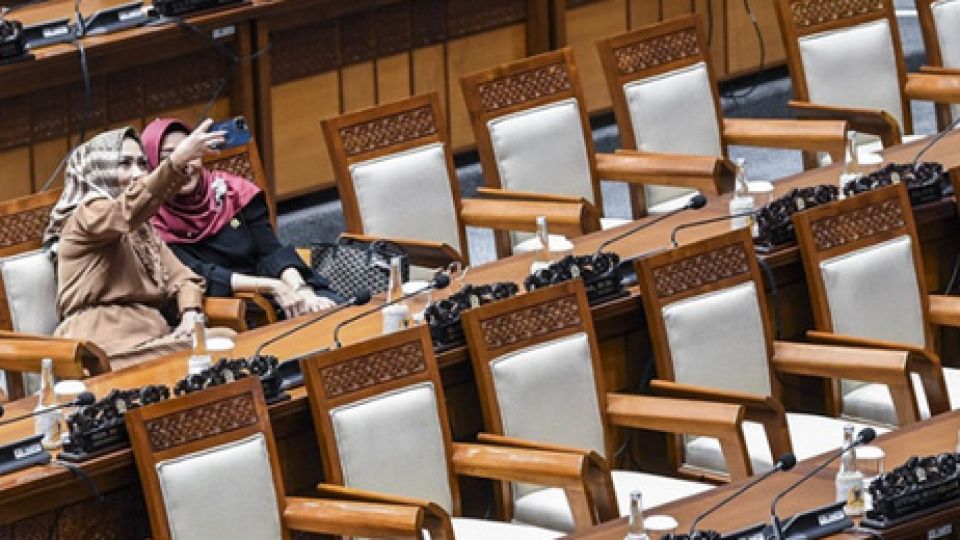May 29, 2024
JAKARTA – The House of Representatives has moved one step closer to revising four laws governing the police, the Indonesian Military (TNI), immigration and the presidential cabinet in the five remaining months of the current lawmakers’ tenure, even as critics protest that the planned changes are not a matter of urgency.
In a plenary session on Tuesday, all nine political parties represented in the House threw their weight behind the bills without any apparent objections, endorsing them as House initiatives and formally starting deliberations on them. The four bills seek to raise the retirement age of National Police officers and TNI personnel and allow for a larger presidential cabinet, among other changes.
The endorsement came less than a month after the House Legislation Body (Baleg) finished drafting the proposed revisions in what critics say was a rushed and cursory process.
A draft of the bill amending the 2002 Police Law obtained by The Jakarta Post contains a provision that would raise the retirement age of officers of certain ranks from 58 to between 60 and 65.
The draft bill would also allow the president, after consulting with the House, to extend the tenure of four-star police generals – the rank of National Police chiefs – indefinitely, without any clear limitations.
The bill revising the 2004 TNI Law would increase the retirement age of TNI personnel of certain ranks, including general, from 58 to between 60 and 65 as well.
A previously planned revision of the TNI Law raised concerns among activists, who feared it would pave the way for the military to return to civilian affairs.
“The latest draft bill does not allow military officers to hold civilian posts in the government without resigning from the force,” Baleg member Mardani Ali Sera of the Prosperous Justice Party (PKS) told the press after the plenary session, adding that past discussions at Baleg had mostly focused on the retirement age.
Now that the bills have become House initiatives, the next step is for Baleg and the presidential administration to discuss the revisions before they can be passed into law in a House plenary session.
Incumbent lawmakers only have the current sitting period and one other later this year before new lawmakers are sworn in in October.
Bigger cabinet
The bill revising the 2008 Ministry Law would scrap a provision that limits the number of ministers in the presidential cabinet to 34. It also calls for the number of ministerial posts to be “determined in accordance with the needs of the sitting president”.
The planned revision came after a proposal to add more ministerial posts to president-elect Prabowo Subianto’s cabinet gained traction among members of his coalition, as the parties supporting him eye strategic posts in the administration.
Read also: Prabowo’s cabinet expansion plan raises budget concerns
Critics say a bigger Prabowo cabinet would simply serve to accommodate his allies with little regard for effective governance or ensuring his programs are executed, a position that pro-Prabowo parties and some rival parties have rejected.
Mardani of the PKS, whose party backed unsuccessful presidential candidate Anies Baswedan in the February election, said the number of ministries should be kept at an effective level.
“There should not be much structure, but [the cabinet should be] well-functioning, following the bureaucratic reform,” he said.
Another bill, proposing to revise the country’s immigration laws, would scrap a prevailing provision that bans persons of interest in criminal investigations who have not been charged with an offense from leaving the country.
Rushed deliberation
Observers have questioned the timing of the four revisions, as they were not included in the House’s National Legislation Program (Prolegnas) of prioritized bills.
Lucius Karus of NGO Indonesia Parliament Watch (Formappi) criticized lawmakers for rushing to formulate the bills just months before their tenure ended.
“It seems that lawmakers put their interests above the interest of the public,” he said.
But Baleg chair Supratman Andi Agtas of the Gerindra Party denied that lawmakers had been unduly rushing the revisions, saying past “Constitutional Court rulings provided the urgency to do so”.
Read also: Opposition grows to broadcasting bill that threatens press freedom
The planned amendments come as lawmakers are under public scrutiny over their efforts to revise other pieces of legislation on contentious grounds, including the 2003 Constitutional Court Law and the 2002 Broadcasting Law.
The revision to the Constitutional Court Law has been criticized by civil groups for proposing to have justices be evaluated after five years in the position and approved by their appointing institutions to retain their posts for another five years or until they reach the statutory retirement age of 70.
The proposed revision to the Broadcasting Law, meanwhile, has been met with opposition from journalist alliances that fear it would curb the freedom of the press.


